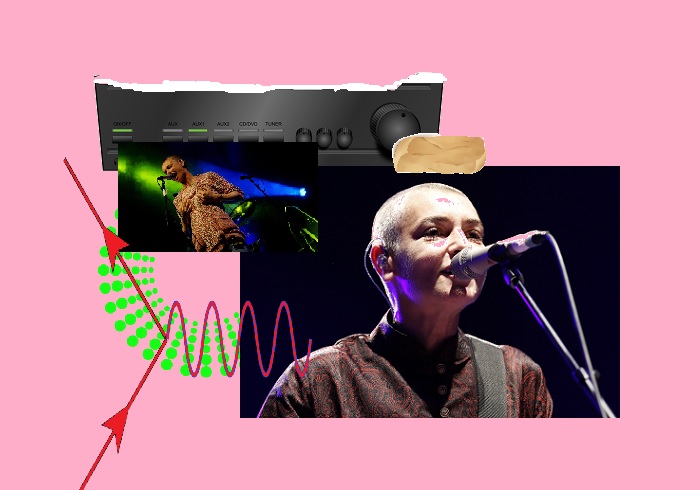
Sinéad O’Connor’s Music Was My Education — Captivating And Cathartic, A Visionary And A Truth-Teller
Captivating and cathartic, a visionary and a truth-teller: playing Sinéad O’Connor’s music was my education.
Sinéad O’Connor was well known for her deeply emotional voice, her outspoken stance on political issues – especially her critique of the Catholic Church – and her explorations of spiritualism and religion, but what I want to talk about, mostly, was her extraordinary songwriting.
O’Connor’s first two albums The Lion and the Cobra (1987) and I Do Not Want What I Haven’t Got (1990) made a huge impression on me when I was just starting to get into music and songwriting in my last year of high school.
I cottoned onto these records a bit late (I was in Year 12 in 1993) but sometimes quality things take a while to filter through to suburban teenage Australian minds. Those records cut right through the other stuff I was listening to: guitar bands with men mostly.
O’Connor’s music was different.
Here was music that focused right in on the voice and the lyrics. Music that told stories full of detail and delivered with sadness and tenderness and anger.
O’Connor was a visionary and a truth-teller. But she was also an important songwriter. She was a highly thoughtful and supple artist who was able to craft songs that combined observational detail, emotional heft and an ethical conscience.
Her songs always felt personal, rather than preachy.
A particular kind of passion
I think I probably first heard O’Connor because a girl at my school would play the song Troy on guitar and it was amazing. Troy was the first single from the first album, but did not become a huge hit.
But it was always a cult favorite – a six minute micro-opus about the end of a relationship – with the kind of opening that put you right there in the moment:
I remember it
Dublin in a rainstorm
Sitting in a long grass in summer
Keeping warm.
And then the allusion to epic Greek myth. What was this!?
On Troy, O’Connor’s amazing voice was so apparent. Tender and lilting at the beginning with shades of traditional Irish folk singing, and then, out of the blue, shockingly angry.
I don’t think any other singer-songwriter performed anger so well. It was captivating and cathartic.
I suppose I must have seen the video for Nothing Compares 2 U around this time – it was everywhere – but really it was some of the other songs on her second album that connected with me. Especially the songwriting.
The Last Day of Our Acquaintance was just such vivid, plain writing:
This is the last day of our acquaintance
I’ll meet you later in somebody’s office
Very adult stuff for a 17-year-old, but I think that was also part of the appeal. This seemed like serious, grown-up songwriting, full of a particular kind of passion.
Also, it was just two chords so I could learn how to play it.
Black Boys on Mopeds managed to weave political commentary into something much more personal. The song addressed police brutality aimed at black British youth, but connected this to both global politics and issues closer to home in Ireland.
Margaret Thatcher on TV
Shocked by the deaths that took place in Beijing
It seems strange that she should be offended
The same orders are given by her.
O’Connor’s ability to contrast the personal detail with big picture politics was second to none and such a fine feature of her songwriting.
Emperor’s New Clothes rocked more, and became one of her better-known, radio-friendly songs, but was still full of great observant songwriting that resonated so much. “How could I possibly know what I want when I was only 21?” she sang.
I learnt to play these songs, and would play them all the time. They were an amazing education.
What connects these songs as a whole is their attention to detail and their compelling combination of fury and sadness, something that runs through the early period of her music.
Courage and insight
It was later, as I grew older, that I realized how extra-remarkable O’Connor’s achievements were given that she was an outspoken woman and an original thinker dealing with oppressive double standards and sexism.
She was so often dismissed by commentators as mad, rather than respected for her courage and insight.
As we know now, she was completely right about the things she spoke up about. In 1992 on Saturday Night Live she tore up a photo of the Pope in protest of the sexual abuse perpetrated and protected by the Catholic Church. It was highly prescient.
Watching that SNL video now, it is so striking how brave she is. Her critique of religion and politics and her later explorations of Islam and Rastafarianism showed her seeking, questioning mind. Just as her songs do.
O’Connor went on to make eight more very diverse albums, including interpretations of traditional Irish folk music and classic roots reggae music. Her singing voice and her political voice should be remembered and celebrated, as should her peerless songwriting.
In a way to process this heartbreaking news, I am spinning her records today and reveling in the power and magic of her songs and singing.![]()
Toby Martin, University of Sydney
Toby Martin, Music historian, University of Sydney
This article is republished from The Conversation under a Creative Commons license. Read the original article.



